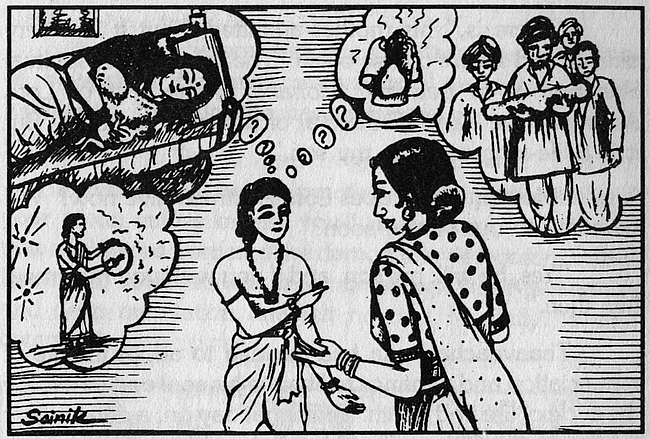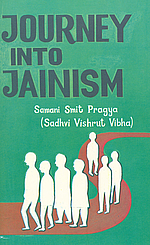A little boy named Thaavaacha Putta was standing atop his home and enjoying the natural beauty of the landscape when a sweet melody from a neighbouring house reached his ears. Curious of its nature, he went to his mother and asked her what it was and what was its significance. His mother told him that the songs were a part of a celebration to welcome a newborn child.
"Were such songs sung at my birth also?" Thaavaacha Putta asked.
"Yes, my dear," his mother answered. "Songs more in number and sweeter than these too."
"Mother, I feel almost as if I have never stopped hearing them."
"Go and listen to them then, my son."
Thaavaacha Putta went back to the roof and listened to the singing. The songs, however, were not as pleasant then. They were harsh and shrill and filled him with a sense of uneasiness. Again he ran to his mother and asked, "What has happened to the songs, Mother? Why are they no longer sweet but strident? Are they being sung by some other person?"
"No, son, the same person is singing, but"
"Why, then, are they different than before?"
"The circumstances have changed," she answered.
"The child who was born a few hours ago has died. That is why the songs have changed into mourning songs."

The child who was born a few hours ago has died.
Thaavaacha Putta was badly shaken by the incident. Full of sorrow, he asked, "Why do people die? Does it not matter how small the person may be?"
"Now don't ask such questions," said his mother rather irritatibly.
"But mother," he protested, "tell me one thing. Will I too have to die in this manner?"
"Not only you, but also I, your father, and everyone will have to die some day, and will be born again according to the good and bad deeds they have done."
Somewhat confounded, Thaav-aacha Putta asked his mother, "Is there any way to escape the cycle of birth and death?"
"There is," his mother admitted, "but it is a very difficult and severe course of life. The only path to spiritual liberation is to perform Sadhana at the feet of Lord Aristnemi, the 22nd Tirthankar of the Jain tradition. But it is a life-long process, my son."
"Mother, where does Lord Aristnemi live now? Will he come to our village soon?"
"Yes, he will, my son, and if you wish you may meet him then."
Thaavaacha Putta had decided to adopt the life of renunciation and penance to liberate his soul and so escape the cycle of life and death. From that day on, a detachment toward worldly things filled his mind and occupied his soul. When Lord Aristnemi came to his town, he was initiated into the monastic Order and ultimately proceeded on the path to enlightment and emancipation.
 Sadhvi Vishrut Vibha
Sadhvi Vishrut Vibha
